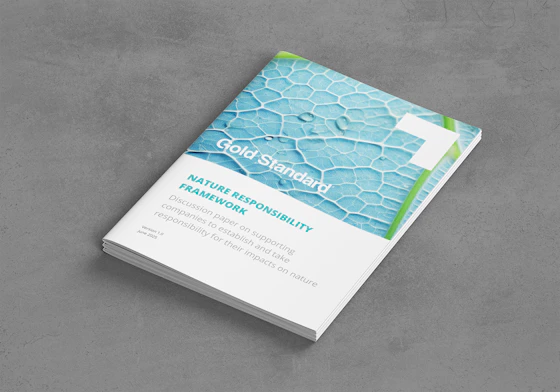Embracing nature isn’t just good for the planet – it’s good for business resilience, innovation and longevity. Yet, nature often comes second in line to climate action. Gold Standard and Shared Planet outline the case for putting nature at the centre of business decision making and announce a corporate nature framework coming in 2025.

Since the signing of the Paris agreement in 2015, efforts to tackle climate change have begun to increase, with over 193 countries signing up to reduce emissions and adapt to the impacts of climate change by 2050. Whilst critical, we sometimes forget that reduction and cessation of Greenhouse Gas (GHG) emissions will not create a sustainable planet by itself.
Since the turn of the century, we have lost 488 million ha of forests. Since 1970 there has been a 73% decline in mammal, bird, reptile, fish and amphibian populations. As well as being an inherent good, nature and biodiversity are critical to the livelihoods of everyone on our planet and are cornerstones of our food, water, medicine and economic growth. 1.6 billion people rely on forests for timber, food, fuel, jobs and shelter – but every human being depends on forests in some way.
Nature is also a core component of the mission to halt and adapt to global temperature changes. Over the last decade, nature (including the ocean, plants, animals and soils) has absorbed 54% of human-made CO2 emissions. Healthy ecosystems, like forests and wetlands, provide crucial protection from extreme weather events like floods. It therefore does not come as a surprise that, according to the World Economic Forum’s Global Risk report, biodiversity and ecosystem collapse is third in their list of top global risks over the next 10 years.
Natural resources and ecosystems underlie global value chains, covering most sectors from agriculture through to technology.
Over half of global GDP, an estimated $44 trillion, is moderately or highly dependent on nature and its services.This means that embracing nature at the core of business decisions isn’t just good for the planet – it’s good for business resilience, innovation and longevity. Adopting a nature-first approach goes beyond allowing businesses to reduce risk or enhance their reputation – it is critical for long-term stability, sustainability, and economic resilience. Inaction threatens business’ stability and resilience due to the presence of physical and regulatory risks. Funding nature is a vital investment.
Physical risks arise from businesses’ high dependency on natural resources and crucial ecosystem services (supporting, regulating and provisioning, cultural). S&P Global Sustainable Data reveals that 85% of the world’s 1200 largest companies rely significantly on natural resources that are currently declining due to overexploitation.
The consequences of resource overexploitation are severe. For example, the loss of pollinators could reduce crop yields, driving up production costs. This could affect the food prices, in turn impacting consumer demand. Businesses should recognise these risks and factor them into the core of their corporate strategies.
Regulatory risks are also growing for businesses as regulators are starting to increase their focus on nature. Europe has seen a host of measures implemented, including;
- the EU Corporate Sustainability Due Diligence Directive (CSDDD), mandating companies to report on both the environmental and social risks they face and their broader impacts on society and the environment
- EU and UK due diligence legislation on forest risk commodities
- the European Green Deal.
These moves have shown that there are ways to create change: nearly half of large companies in Europe are now taking significant action towards sustainability goals.
Understanding the concrete risks companies face (based on an assessment of their nature impact and dependencies), allows businesses to not just take effective actions to reduce these risks, but also to lean into opportunities.
To support corporates in navigating the risks and opportunities of nature, Gold Standard will be releasing a corporate nature responsibility framework in 2025. The framework will not only support companies to properly take responsibility for their impacts on nature but will help civil society, academia and governments as they encourage them to do the right thing.
Building on and complementing the work of the International Union for Conservation of Nature (IUCN), the World Business Council for Sustainable Development (WBCSD), Business for Nature, The Taskforce on Nature-related Financial Disclosures (TNFD), and global standard-setters like the Science Based Targets Network (SBTN), it will provide a best-practice framework for corporate action on nature, set out in a series of principles.
Aligning with nature-based solutions and sustainable practices can open new markets, enable green innovation (market opportunities), and position companies as leaders and influencers in a low-carbon economy. It can also help companies recruit increasingly nature-aware employees.
The case for action on nature is just as strong as that for climate action, however, they should not be viewed as separate – they are two sides of the same coin. Companies looking at agricultural supply chains can address both climate and nature in almost all their investments.
Sustainable agricultural practices, sustainable landscapes, certified commodities, and carbon credit investments should all consider nature wherever possible. By taking nature into account companies can not only reduce their risks, but get powerful recognition as a leader, differentiating them from their peers.
Stay up to date with Gold Standard news
Sign up to the Gold Standard Corporate Newsletter to be first to hear about our work on nature.


